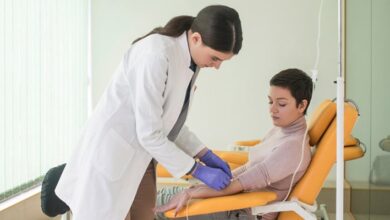Related Health Conditions for ED

While there is no cure for ED, there are a number of treatments that can improve a man’s symptoms. One popular treatment is sex therapy. This is an effective method to help a man cope with his problem and open up to his partner. In some cases, a man may also be prescribed hormone replacement therapy to help treat ED. However, this treatment is only effective if a physician has determined that low hormone levels are the cause of ED.
There are two types of ED. One is called “premature ejaculation” and occurs prior to the vaginal penetration. This form of ED is acquired, while the other is lifelong. Both forms of ED can have a negative personal impact. Psychogenic ED can be due to performance anxiety or may be caused by a serious medical condition. The patient’s sexual and medical history can help a doctor determine the exact cause of the problem.
Other causes of erectile dysfunction include organic ED, which is caused by abnormalities in the penile arteries and veins. This is the most common type of ED, especially in older men. Arteriosclerosis is a common cause, but sometimes it is caused by trauma to the arteries. Other risk factors include cigarette smoking and being overweight.
Treatment for ED is often a combination of lifestyle changes and medication. The medication should be carefully evaluated for possible side effects. In some cases, a psychologist may be recommended to address any underlying psychological issues. However, it is always best to discuss all options with a doctor such as the professionals at www.primemensmedical.com before choosing a treatment option.
Injection therapy may be used to treat erectile dysfunction, but it is important to note that it can cause side effects. For example, injection therapy may cause dizziness and high blood pressure. In addition, patients may experience painful erections for up to two hours. Taking these medications appropriately can reduce these side effects.
While many underlying medical conditions can cause ED, proper diagnosis and treatment are essential to improving the quality of life for the man and his partner. Proper diagnosis will reveal any underlying medical conditions that are limiting a man’s sexual ability and overall health. Moreover, untreated ED can impair a man’s sexual life and can lead to debilitating effects on mental health and relationships.
Erectile dysfunction is a common problem and can affect many aspects of life. It may result from alcohol or certain health conditions. Alcohol consumption, alcohol use, and relationship issues are all factors that contribute to erectile dysfunction. The best way to treat this problem is to visit a physician for diagnosis and treatment.
There are many prescription medications for erectile dysfunction, and a healthy lifestyle can also help. Some men may even benefit from an extracorporeal shock wave therapy, which helps fix the tissues in the penis and restore natural erections.
A number of treatments exist for ED, from oral medications to surgical procedures. The right choice for each patient is based on their specific needs, age, and general health. Many doctors will recommend a step-by-step process to determine the best solution. Others may skip certain treatment options entirely. Either way, the ultimate goal of ED treatment is to restore sexual pleasure and intimacy.
Vacuum constriction devices are one option for men with ED. These devices are cylinders that are placed over the penis. The air from the cylinder draws blood to the penis, causing an erection. The cylinder can be removed after sex or repaired afterward if it does not work well. Alternatively, some men may opt for a penile pump or an inflatable rod.
The cause of ED can be a variety of factors, including health conditions, alcohol consumption, and other psychological issues. It is important to determine the actual cause before seeking treatment. If the symptoms of ED have been bothersome for a long time, see your doctor. Medications, alcohol, and relationship issues can all cause erectile dysfunction.
The cavernous nerves in the penis travel from the underside to the prostate, and they regulate the blood flow within the penis. They can also be affected by vascular disease, including atherosclerosis. An early symptom of erectile dysfunction is a poor ability to maintain an erection.
A doctor may prescribe an oral medication to improve erectile function. The medication works by inhibiting the enzyme PDE5 in the penile sphincter. It also acts as an enhancer of nitric oxide-cGMP pathways. These treatments may be more effective than the individual drugs alone, and they may have fewer side effects.
Other causes of erectile dysfunction include neurological disorders, and vascular disease. Diabetes and stroke damage the nerves that send impulses to the penis. Stress, trauma, and mental health problems can also lead to erectile dysfunction. For these reasons, erectile dysfunction is important to be diagnosed and treated.
In some cultures, erectile dysfunction is a normal part of aging. It may even be seen as a positive sign of healthy aging. For example, a recent study of 250 Mexican men found that most men did not perceive a decline in erectile function as a biological pathology. Instead, they saw it as a socially acceptable aging aid. Older men in Mexico often pursued sexual activity outside the marriage, and decreased erectile function helped them overcome infidelity.
Another treatment option for men with ED is a penile prosthesis. This is a surgical procedure that involves a small incision and placement of the device inside the penis. Penile implants do have some risks, but they are relatively low. Most men who undergo penile implant surgery are satisfied with their results. In addition, most patients who undergo the procedure say they would choose it again.
For patients with chronic erectile dysfunction, oral medications may be prescribed. These drugs may improve blood flow to penile tissues, which may encourage the recovery of spontaneous erections. They are relatively safe and do not cause any long-term harm when used as directed. As a result, these drugs may help men avoid surgery and maintain intimacy while they recover from ED.
Visit “Prime Men’s Medical Center
6622 Southpoint Drive South, Suite 230 Jacksonville, FL 32216
800-671-5291
Monday-Friday 9am-6pm
https://primemensmedical.com”



